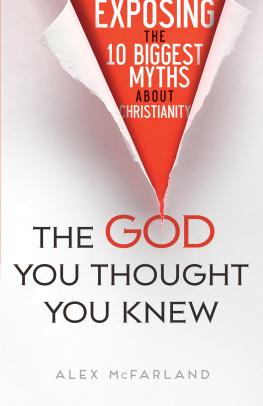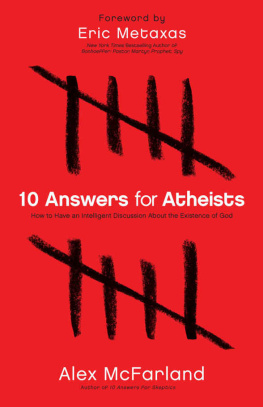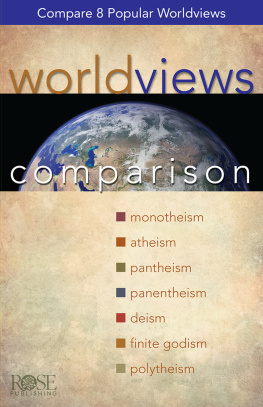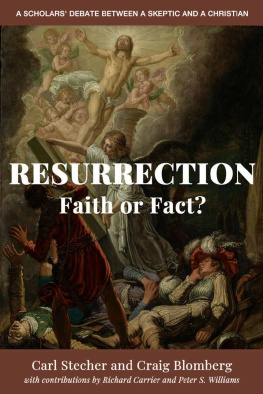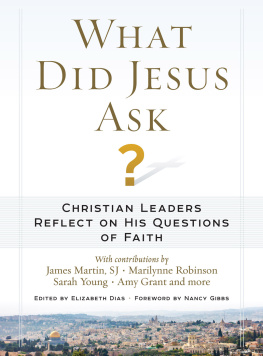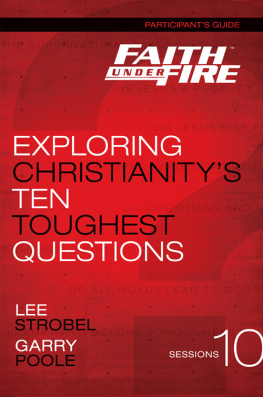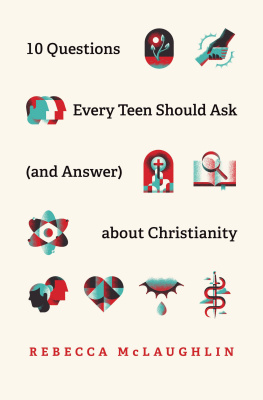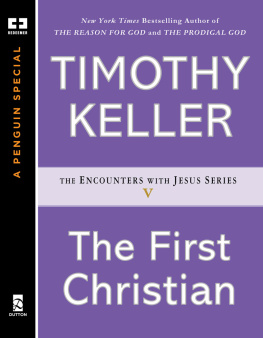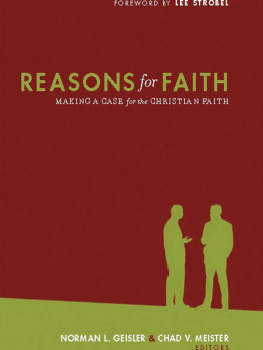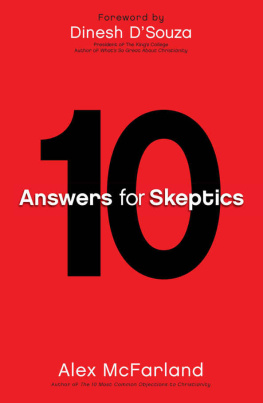

Copyright 2011
by Elmer L. Towns and Alex McFarland
All rights reserved.
ISBN: 9781433671814
Published by B&H Publishing Group
Nashville, Tennessee
Dewey Decimal Classification: 234.2
Subject Heading: FAITH \ CHRISTIAN LIFE \ DOCTRINAL THEOLOGY
Unless otherwise stated, Scripture quotations have been taken from the Holman Christian Standard Bible, Copyright 1999, 2000, 2002, 2003, by Holman Bible Publishers. Used by permission. Holman Christian Standard Bible, Holman CSB and HCSB are federally registered trademarks of Holman Bible Publishers.
Also used: New International Version (NIV), copyright 1973, 1978, 1975, 1977; used by permission.
Also used: New Living Translation (NLT), copyright 1996, 2004, 2007 by Tyndale House Foundation. Used by permission of Tyndale House Publishers, Inc., Carol Stream, Illinois 60188. All rights reserved.
Also used: The Living Bible (TLB), copyright Tyndale House Publishers, Wheaton, Ill, 1971, used by permission.
Also used: English Standard Version (ESV), copyright 2001 by Crossway, a publishing ministry of Good News Publishers. All rights reserved.
Also used: Phillips, reprinted with permission of Macmillan Publishing Co., Inc. from J. B. Phillips: The New Testament in Modern English, revised edition, J. B. Phillips 1958, 1960, 1972.
1 2 3 4 5 6 7 8 15 14 13 12 11
IN APPRECIATION
In appreciation to Mrs. Linda Elliott, my editorial assistant, who re-typed my chapters, edited them more than once, and proofread and formatted the footnotes.
To my constant research assistant who always gives me more data than I need, who is available 365/24, who is patient to pursue data when I lose my notes, and my counselor and teacherthanks to Google.
After spending thirty years answering questions sent to Jerry Falwell, I realize Christians have questions; God has answers and He uses the Bible to enlighten any who seek answers to the hard questions in life.
Elmer L. Towns, cofounder
and dean, School of Religion
Liberty University
The following people have greatly assisted me in the writing of my portions of this book: Stephanie Roberts, a very gifted graduate student at Southern Evangelical Seminary; Christina Woodside, writing instructor, resourceful assistant, and proofreader par excellence; Richard Howe, Ph.D., who provided some key research on the chapter dealing with the origin of the universe.
Very special thanks are due to Mr. Tom Neven, who helped format and clarify this work.
I am deeply grateful for Dr. Elmer Towns, who has been to me a Sunday school teacher, professor, friend, and now collaborator. He has excelled in all of these roles.
Most of all, I am thankful to the Lord Jesus Christ, who has allowed me to experience the joy of salvation and the privilege of service.
Alex McFarland, former president
Southern Evangelical Seminary, speaker, and broadcaster
Contents
Preface
We have written Ten Questions Every Christian Must Answer because each question involves an attack on Christianity. These questions begin with the age-old inquiry about the existence of truth and end with the knotty question about hell.
Is There Such a Thing as Absolute Truth? (Alex McFarland)
How Can I Know There Is a God? (Alex McFarland)
Where Did the Universe Come From? (Alex McFarland)
Is the Bible Reliable? (Elmer Towns)
Is Jesus the Only Way? (Elmer Towns)
Are the Claims of Jesus' Physical Resurrection from the Dead Valid? (Alex McFarland)
Are the Heathen Really Lost? (Elmer Towns)
Is Hell a Real Place That Lasts for Eternity? (Alex McFarland)
Must a Person Believe in Jesus or Make Him Lord of His life to Be Saved? (Elmer Towns)
How Detailed Is God's Wonderful Plan for Each Individual Life? (Elmer Towns)
Conclusion: Truth in Real Life (Alex McFarland)
The answers to these ten questions will give you ammunition to use with the unsaved. However, you may need these answers more than they. Many Christians need answers to confirm their faith that Christianity is right. Also these answers may be needed to share when someone challenges your faith. These answers will help you deal kindly with someone (Christian or non-Christian) who is confused about Christianity.
But some people do not want answers. They are not seeking truth. They have their minds made up and perhaps they throw questions at you to destroy your faith.
Some skeptics like to argue for the sake of arguing. You answer one question, and they have another question. Some have their agenda settled and they "don't want to be confused by the facts." Maybe some skeptics are God-rejecters; they argue because they have rejected God with their hearts (their emotions and belief system). They don't want answers; they want to win an argument.
Skeptics probably do not need answers; they need a relationship with a believer who will reach them where they are and lift them to God. They may need to see "Christ in you, the hope of glory" (Col 1:27). When they are convinced that you live with integrity, then they will listen.
What is our authority? Some unsaved friends won't listen to rational explanations. They first need a loving relationship before a believer can present an answer to the questions in this book.
But some questions do not come from the frustration of academic problems. Some people may have an honest straightforward question (e.g., "What must I do to be saved?" [Acts 16:30]). They may have a probing question (e.g., "How can anyone be born when he is old?... Can he enter his mother's womb a second time and be born?" [John 3:4]). These seekers need answers from Scripture, with an explanation.
The attitude that you the reader bring to the questions in this book is important. If we demonstrated intellectually there is a God, would you accept His existence? Would you turn to Him for salvation? If you were convinced He is the Creator, and you were a creation of His hands, would you obey His commands?
Perhaps you come to these questions knowing there is a God, and that you are His child. But some of these questions perplex you; or some questions may even irritate you. Then you are a seekermaybe a wounded seeker who needs logical answers to these questions.
Each chapter includes a section called POINT. This is a statement of what Christians have always believed and how they look at the question.
Each chapter also includes COUNTERPOINT, the beliefs of those who reject the Christian answer. The COUNTERPOINT is the reason some attack Christianity with this protracted question. Following COUNTERPOINT are the reasons why skeptics reject Christian answers, and/or the arguments by the skeptic for their point of view. If we do not recognize and answer the arguments of skeptics, then we cannot help them nor can we strengthen our faith.
Getting a Grip on the Term Apologetics
The questions (and those asking them) deserve good answers. I (Alex) often make the following statement in my opening remarks to audiences: "The claims of Christianity are affirmed by compelling lines of evidence. The positive evidence for Christianity sets it apart from all other faith systems." College students especially are intrigued by such claims and by the content that follows.
But whether the questions relate to truth, God's existence and nature, the Bible, Jesus Christ, or the question of why God would allow pain and suffering in the worldChristianity does have a threefold advantage: (a) positive evidence points in its favor, (b) no legitimate negative evidence exists to refute it, and (c) the objections raised against Christianity can be satisfactorily answered.
Next page

